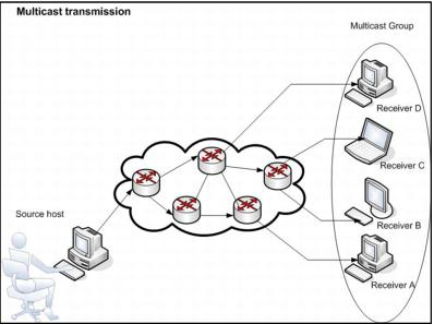Static routes
You can create a static route to forward packets to a destination other than the configured default gateway.
When you add a static route, you specify which interface the packet leaves, and to which device the packet is routed.
You can configure unicast and multicast routes in the firewall.
Unicast routes send data from a sender to a recipient.
You can load-balance traffic to a destination over static IPv4 unicast routes through equal-cost multipath routing (ECMP). The firewall routes traffic to multiple paths with equal administrative distance and metric but different next-hop routers.
IP multicast
Internet Protocol (IP) multicast is a bandwidth-conserving technology that reduces traffic by simultaneously delivering a single stream of information to thousands of recipients.
Applications, such as video conferencing, corporate communications, distance learning, and distribution of software use IP multicasting.
Multicast group
Multicast is based on the concept of a group. An arbitrary group of hosts expresses an interest in receiving a specific data stream. The hosts can be located anywhere on the internet. Hosts that are interested in receiving data flowing to a specific group must join the group to receive the data stream.
IP multicast addresses
Multicast addresses specify an arbitrary group of IP hosts that have joined the group and want to receive traffic sent to this group.
IP class D addresses
The Internet Assigned Numbers Authority (IANA) controls the assignment of IP multicast addresses. Multicast addresses fall in class D address space ranging from 224.0.0.0 to 239.255.255.255.
This address range is only for IP multicast traffic's group or destination address. The source address for multicast datagrams is always the unicast source address.
Multicast forwarding
Routers only forward multicast traffic to networks where other multicast hosts are listening.
Hosts and routers must be multicast-capable for multicast forwarding to work across inter-networks.
A multicast-capable host can do the following:
- Send and receive multicast packets.
- Register multicast addresses with local routers, so that the firewall can forward multicast packets to the host's network.
IP multicasting applications that send multicast traffic must construct IP packets with the appropriate IP multicast address as the destination IP address. IP multicasting applications that receive multicast traffic must inform the TCP/IP protocol that they are listening for all traffic to a specified IP multicast address.
